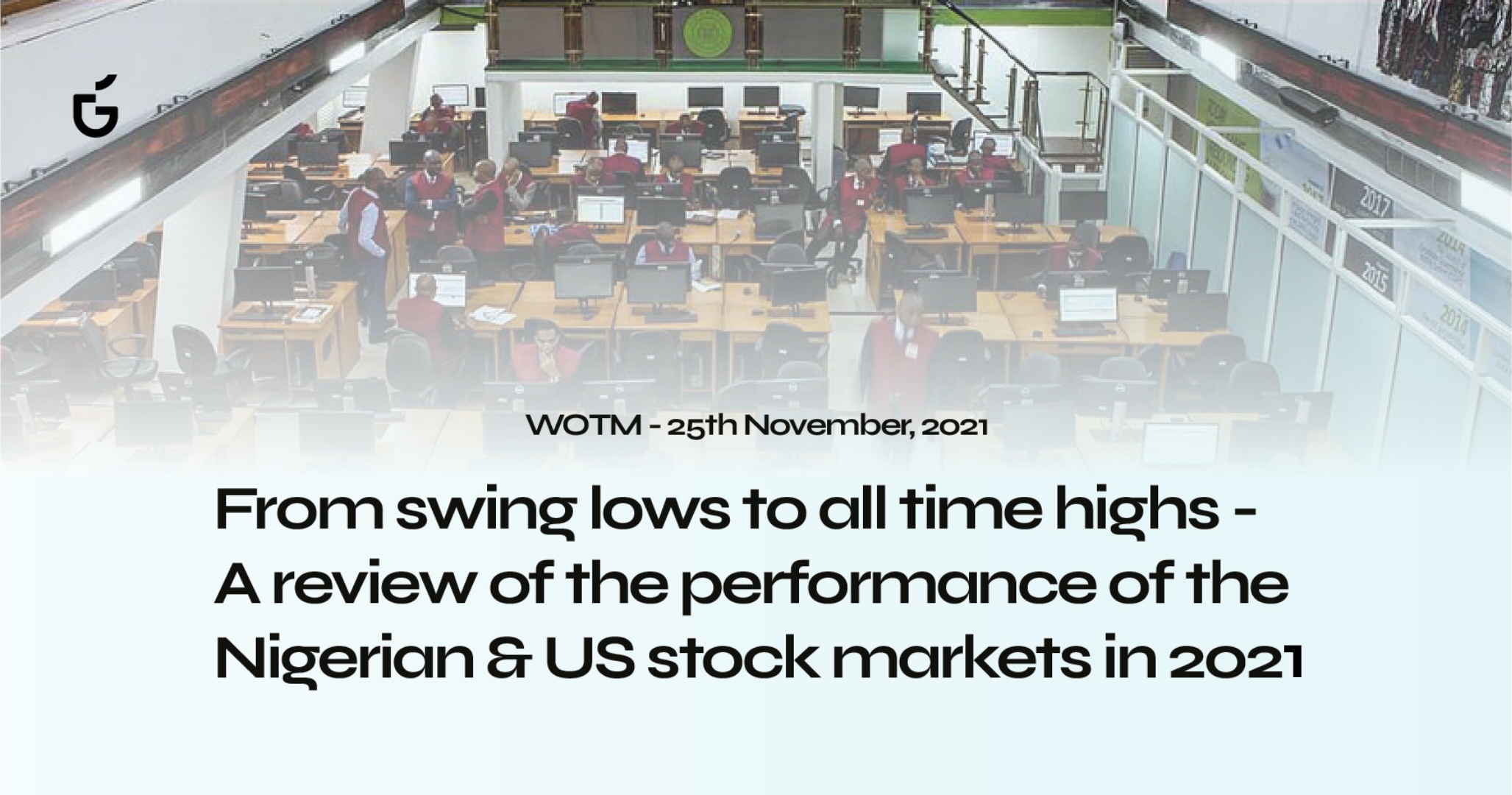 Africa
AfricaUnderstanding how companies are valued – A look into the MainOne acquisition
15 December, 2021
07 October, 2021 | 4 MINS READ
The Stories
Evergrande Group
Evergrande, China’s second-largest property developer by sales has been in the news since mid-September for a possible default on its debt. The company which has a debt profile of about $300 billion has been unable to pay suppliers and has warned investors of a possible default on loans in the coming weeks.
The US Debt Ceiling
The Republicans and the Democrats in the US Congress have been at loggerheads, since July 2021, on raising the debt ceiling. The debt ceiling, which puts a cap on how much the US government can borrow, has to be raised before October 18th, 2021. If the debt ceiling is not raised, it will send a signal on a possible default by the US on their debt obligations but US creditors know by now that this is more a political issue than an economic issue
Supply Chain Induced-Inflation
The pandemic dealt the global supply chain a major blow in 2020 and the current energy crunch in major continents around the world seems to be dealing more of a blow. Government stimulus funds and the re-opening of economies around the world are fueling demand for goods. However, growing demand in the face of limited supply is inducing a rise in inflation.
A little about Evergrande Group & why it is rolling in debt
Evergrande is mainly a real estate development company with over 1,300 real estate projects in about 280 Chinese cities. The group also has businesses in electric vehicles, healthcare services, consumer products, sports & television production. According to the company’s website, it has 200,000 employees and indirectly creates over 3.8 million jobs annually.
Why it is in debt?
Before Q3 2020, Evergrande had been borrowing to finance its many businesses. Unfortunately, the Chinese government, in a bid to limit the level of leverage real estate developers were taking on in the wake of the recovery of the real estate market, put a ceiling on how much real estate developers could borrow in 2020. The ceiling also specified that borrowed funds could only be used for debt refinancing.
This together with declining interest in residential properties did Evergrande’s cash flow in and led to its liquidity crunch. The company is trying to salvage the situation by selling off its assets and repaying suppliers with uncompleted real estate projects. The group has however been unable to attract buyers for its assets.
Hopson Development Company, one of the top 5 real estate companies in China has indicated an interest in acquiring 51% of Evergrande’s property services unit for $5 billion. This has led to the suspension of trading on the shares of both companies.
What are the Implications of Evergrande’s Possible Default on Financial Markets?
Evergrande is part of the global 500 i.e., one of the biggest companies in the world by revenue and it is included in several indexes in Asia (the world’s second-largest capital market). This implies Evergrande’s fall would have a ripple effect across financial markets. Already, its share price has lost over 80% this year.
Besides this, the group owes 171 domestic banks and 121 other financial firms, if it defaults on its loans, it will trigger a credit crunch where banks are unwilling to lend at affordable rates. This would stunt economic growth in the world’s second-largest economy as companies in China will be unable to borrow for expansion and growth projects.
Given the systemic risk Evergrande poses, expectations are that the Chinese government will step in to the situation by bailing the company out. The government is yet to say anything about a possible bailout, they have however promised to keep the Chinese financial market liquid.
The US Debt Ceiling
The debt limit or debt ceiling like it is popularly known in the US is the maximum amount the US government can borrow by issuing bonds. Once the government’s debt levels rise to the set limit, Congress is expected to raise the limit, or the US Treasury will have to seek other means of funding the government till the limit is raised. Should there be a failure to raise or suspend the debt ceiling, the US government will depend on its emergency funds to fund expenditure and debt obligations. Once the emergency funds are exhausted, the government reaches a “drop-dead date” in which it can no longer meet debt obligations and may have to shut down. Though the US government has never defaulted on its loans, history shows that getting close to defaults can lead to a credit rating downgrade and distort financial markets. Given its position in the world, the US getting close to a default poses a systemic risk to the world economy.
The drop-dead date for this era is October 18, 2021, and should the Congress fail to raise rates by that date the president might be forced to cite the 14 amendment and give the treasury secretary the permission to issue new bonds in excess of the debt ceiling in order to meet spending obligation and pay the national debt. This decision can however be challenged in the supreme court.
The Congress’s inability to raise the debt ceiling as at when due, is negative for the dollar as the trade currency in the world economy. Already the value of the dollar has been hit by rising inflation.
Supply Chain Induced Inflation
The pandemic dealt global supply chain a huge blow and just when it seems like things were getting back to normal, issues in different parts of the world happening at the same time are misaligning the supply chain again. The energy crunch in Europe & Asia, Brexit in the UK, etc. Given that consumers pocket has been pumped with government stimulus and economies are starting to learn to live with the pandemic, demand for goods keeps growing while supply can’t seem to keep up. This is inducing an inflation rise.
Inflation is of 2 two types, demand-pull inflation, and cost push inflation. Demand-pull inflation is a situation where demand exceeds supply because there is too much money circulating in the economy. While cost-push inflation is when there is a supply short fall resulting from higher cost of production. Demand pull inflation is easier to deal with, usually, the regulatory authority raises interest rates to suck out the excess funds from the economy. Cost push inflation is more difficult to deal with and the supply chain induced inflation is more cost push than demand pull as things are distorted from the supply end. Shortage of supply of raw materials that goes into the production of goods makes those goods expensive. Fixing the distortion will take time and its quite expensive to fix.
This implies prices may remain elevated for a while and while central banks may start to raise interest rates to salvage the situation, that wouldn’t quite fix the problem as the clog in supply needs to be cleared for inflation numbers to recede.
Bringing it Home, What Do all these Mean for Nigeria and Investors?
China & Europe are major trade partners to almost every country in the world including Nigeria. With the supply chain disrupted in China and European countries, the export of goods made in China and Europe to Nigeria will be slow down, and given existing demand for those goods, prices will rise. This also has a direct effect on goods produced with raw materials imported from those regions. This coupled with the existing foreign exchange challenges implies inflation in Nigeria will remain elevated for a while.
If the US Congress remains at loggerheads over the debt ceiling till mid-October, the US government may shut down its operations and this would signal to financial markets that the US may default on its debt obligations. The last time this happened, financials went into a selling frenzy as the US had its credit rating downgraded. This together with the Evergrande situation in China could lead to a repeat of the financial meltdown of 2008 where there was a sell-off of financial assets globally.
Nigeria will benefit from high oil prices, given the energy crunch and limited supply from OPEC+. The gains from that are capped by the country’s huge subsidy bill. Coal is in high demand globally; Nigeria can take advantage of that by ramping up coal production to improve foreign exchange earnings.
Given the inflationary environment across the world, and the continuous loss of value of fiat currencies, we may see a rise in the value of cryptocurrencies but that also may be muted by the strict regulations surrounding the use of cryptocurrencies around the world. Investors are advised to keep their portfolios diversified across safety and growth assets to mitigate against systemic risk.
 Africa
Africa15 December, 2021
 Africa
Africa09 December, 2021
Join the biggest
investment club in Nigeria.